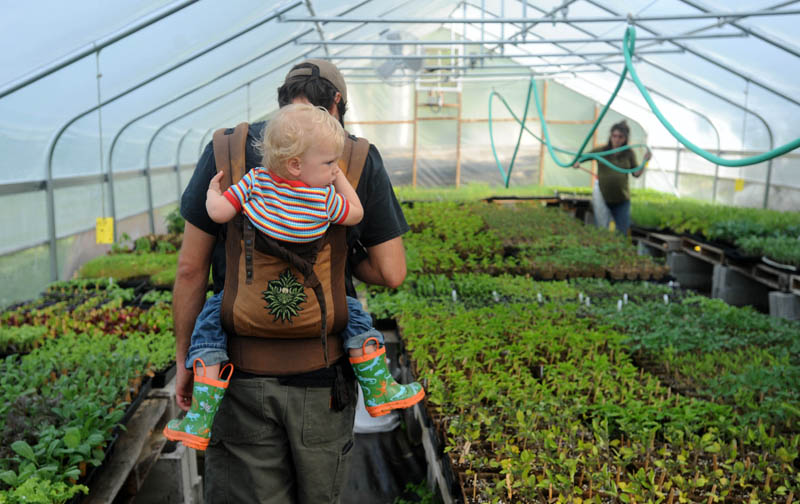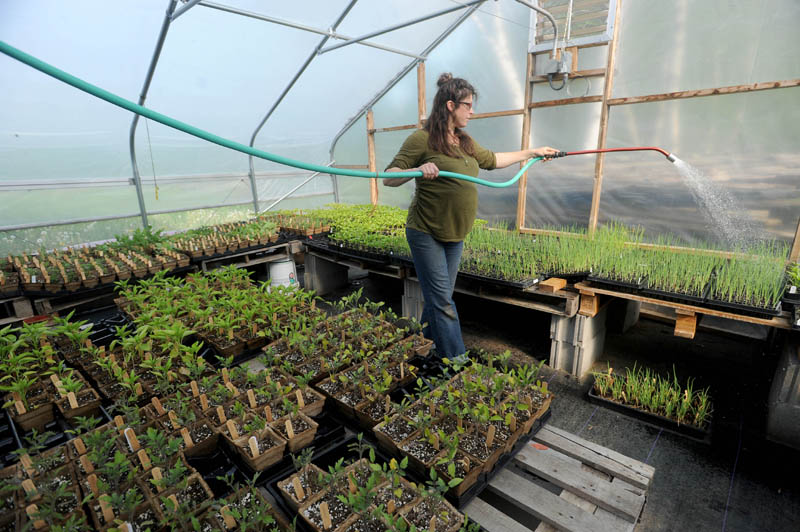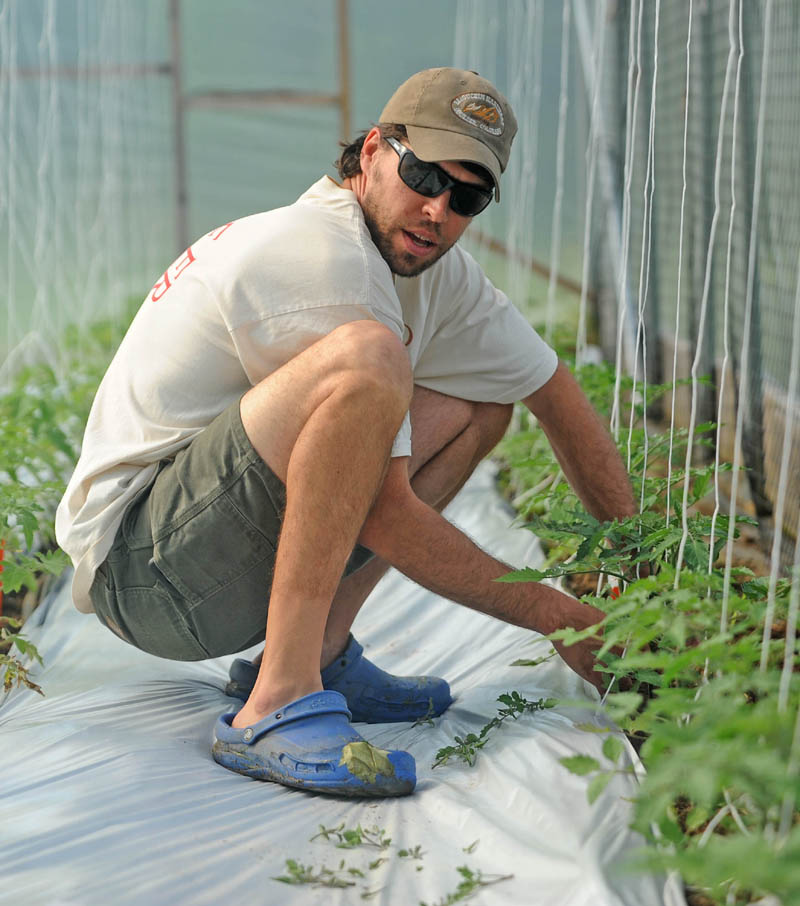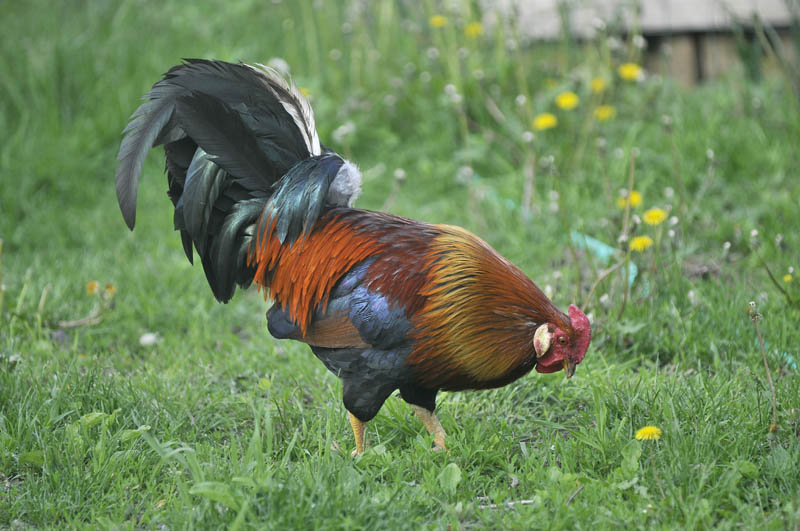To passers-by, the barns and landmark red farmhouse of One Drop Farm on Route 150 in Cornville look like just another farm.
A large rooster with a white feathered cowl and black tail plumage patrols the barnyard, marching past stacked firewood, old farm equipment, green houses, vegetable gardens, a livestock pasture and chicken pens.
But to farmer Ann Mefferd, it’s a purpose — a way to make a difference in life.
In 2008, Ann and Andrew Mefferd, then 31 and 32, moved from Pennsylvania and bought the 127-acre Beckwith Farm.
Now that rooster patrols a barnyard where 300 hens produce as many as 120 dozen organic eggs every week.
“We were looking for a purpose. I wanted to feel good about what I did at the end of the day and wanted to feel like I’ve made some kind of a difference,” Ann Mefferd said.
“I wanted to feel like my whole lifestyle was in line with my thinking about the world, like the ‘be the change you want to see in the world.'”
The Mefferds are not alone. They and other young families are part of a growing Maine trend of young people moving to farms, and in some cases, moving back to the farm where they grew up. The farmers, many of them in Somerset County, in turn are supported by a growing trend of local shoppers eager to buy local foods, making the farms to flourish.
The Mefferds have college degrees in environmental studies, both worked as apprentices on organic farms in the area and they wanted a place of their own.
John Harker, director of production development at the Maine Department of Agriculture, Food and Rural Resources, said the Mefferds reflect the trend of young people returning to the land.
“While the census data is a bit dated, the trend seems to be holding into 2013, based on anecdotal observations of young farmers buying property and attending farmers’ markets and agricultural meetings,” Harker said.
He said one of the biggest changes in the statewide census data is in the under-25 category, with the number of farmers jumping from 49 to 221 — a 351 percent increase — between 2002 and 2007, the most recent data available. In the 25-to-34 age group, the numbers rose from 278 to 792, an increase of 185 percent over the same period.
Using data from the U.S. Department of Agriculture 2007 data, Harker said young farmers make up more of the farm owners and managers in Maine than in previous decades.
“There is a movement for more people who want to grow their own food or start a small food business,” he said.
Harker said more colleges also are offering sustainable agriculture programs. He said a large percentage of those attending those classes are young families that want to start farming in a serious way.
He said it appears to be a philosophy of living that embraces healthful food and lifestyle.
Growing awareness
Ann Mefferd works the farm during the day, while for now at least Andrew works in the research department at farm and garden business Johnny’s Selected Seeds. That’s also reflective of the trend of these new back-to-the-landers.
“When we counsel young farmers, we tell them they must have outside jobs or outside sources of income in order to be successful,” Harker said.
Mefferd said she and her husband chose Somerset County because many there embrace the trend of consuming locally produced food as opposed to packaged and manufactured food that is shipped from growers hundreds of miles away.
“We hit a gold mine,” Ann Mefferd said. “We had no idea what was going on here in this area when we found the farm. People still have practical skills here. It’s an area of the country where neighborliness is still present.”
The Skowhegan Farmer’s Market, where the Mefferds and 20 other local vendors sell their produce, now offers everything from greens to cheese, breads, meat and herbal products — all raised locally.
“People are becoming more aware of what they’re putting into their bodies,” she said. “We landed in the right spot, where people’s awareness is on the upswing, and they also are interested in preserving the heritage of the area, which is agricultural.”
The Mefferds sell produce and eggs at the Skowhegan Farmers Market twice a week during the summer. They sell wholesale to the three health food stores in Skowhegan, Barrels and Uncle Dean’s food markets in Waterville, the MaineGeneral Medical Center campuses, and the kitchen at the Maine Academy of Natural Sciences on the Good Will-Hinckley campus in Fairfield. All of the feed grain for livestock and all of the produce is certified organic by the Maine Organic Farmers and Growers Association, she said.
Since 2008, the Mefferds said they have doubled their gross income each year because of the growing interest in local food and all of the new businesses growing around the local food movement, including The Pickup, a community supported agriculture program operating in the Somerset Grist Mill in downtown Skowhegan.
The Pickup spent more than $100,000 buying food from more than 40 area farms last year, which then was sold in weekly shares, according to Grist Mill founder Amber Lambke. She said the Skowhegan Farmers’ Market has grown fourfold since 2005, largely because of community support for local food.
A cafe at The Pickup also uses locally produced salads, bread, meat, cheese and eggs.
“The advantages of consuming locally is economics,” Lambke said. “There’s nutritional benefits, too. There’s benefits to keeping our dollars in the community and keeping our farmland as farmland that make for beautiful places that attract other people here to live, to recreate.”
Lambke said local organizers are finding ways to get grant money for the expansion of agriculture. She said that is made possible by partnerships with Somerset Economic Development Corp., the state Department of Agriculture, the Wholesome Wave Foundation and others.
Lambke said people no longer want big industry producing the food they eat. There are safety concerns and distribution-of-wealth issues that are resolved by supporting local economies, she said.
“Farming is a lifestyle choice,” Lambke said. “It’s one that many of these young farmers are choosing because they see the benefits in a well-rounded lifestyle they think will be good for their kids and good for their families and good for their health and good for the Earth. You may not get rich, but it’s a good life.”
The good life
The good life also comes with a measure of uncertainty, some of the young farmers say.
“Farming is a huge gamble, especially with a family-sized farm like ours, but if it gets in your blood, it’s all you want to do,” said Kassie Dwyer, 24, who grew up in Athens on her grandparents’ dairy farm. She and her husband, Joe, also 24, recently bought 66 acres of it for themselves.
“We have to make sure we think everything through and have a backup plan. We love being able to provide for ourselves and not have to rely on others,” she said.
The couple raise about 20 beef cattle and both work full time off the farm. Their beef is sold directly to local customers.
“I saw my grandparents go through some very hard times on their farm,” she said. “Still, I never thought twice about staying in agriculture. Farming is something that is in your blood. If you love it enough, you can’t stay away. The cattle are what really keep me hooked.”
Amy Clark, 29, of Crooked Face Creamery in Skowhegan, agrees. She said both she and her husband, Josh, 30, grew up on local farms and decided to continue the family tradition. They started in Norridgewock at her family’s farm and now live in Skowhegan at the former Clark’s Livestock, a farm they are buying from her husband’s family. Both work full time on the farm, milking 40 cows and raising beef cattle and whey-fed pigs.
“It’s a lifestyle; it’s the way we want to raise our own family,” Amy Clark said. “We love the work. We love the animals. it’s kind of just in our blood, I guess. At least we’re happy. We like what we do, and I think there’s risk in anything that you do.”
Doug Harlow — 612-2367
dharlow@centralmaine.com
Send questions/comments to the editors.







Comments are no longer available on this story